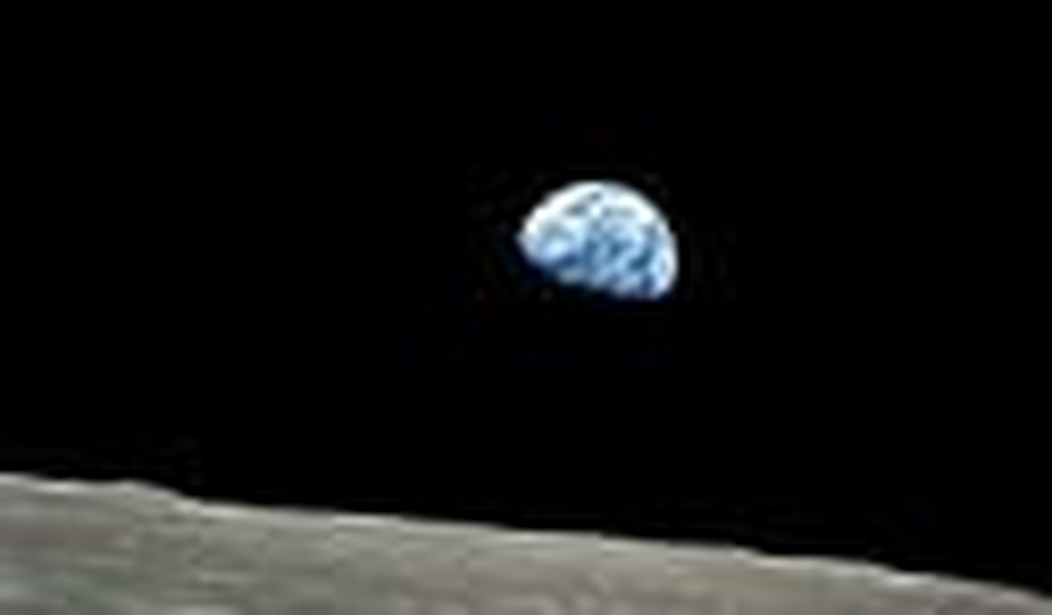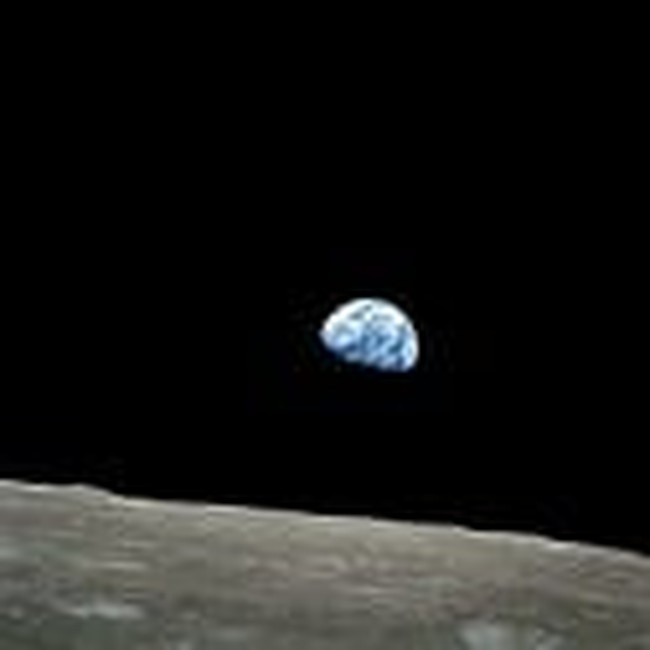During Christmastime in 1968, one of the most significant events in human history occurred. The flight of Apollo 8 marked the first time humans departed Earth orbit and traveled to the dark side of the moon. The Christmas Eve lunar orbit of Apollo 8 also marked one of most profoundly unifying moments for our nation. The journey to space was on everyone’s mind Christmas morning. And the fulfillment of man’s most ancient dream was illuminated by man’s most ancient text, while the entire world watched in wonder.
With the eventual landing of Apollo 11 on the surface of the moon, the achievement of Apollo 8 was nudged into the background. School textbooks teach about Apollo 11, but not Apollo 8. Yet the lunar landing of Apollo 11 merely capped off the journey of Apollo 8. As the world watched on live television, Frank Borman, Jim Lovell, and William Anders departed Earth orbit for space and orbited the moon for the first time.
Perhaps only the circumnavigation of Magellan in 1522 can compare to Apollo 8, and Magellan himself died halfway around the globe. It had a fraction of the significance and risk of Apollo 8. Centuries of experience animated any 16th century sea voyage. When Frank Borman and his crew ignited a single engine burn to leave Earth orbit, they were in a fragile capsule only 12 feet in diameter crossing the cold dangerous expanse of space. Simply, Apollo 8 may be the most significant event in the history of human exploration.
Not only were Borman and his crew the first to depart Earth orbit, they still hold the record for the highest altitude flight. Because of the type of lunar orbit Apollo 8 deployed, they ventured further from Earth than any subsequent manned craft. They were also the first humans to gaze on the totality of the entire Earth. Just imagine their awe.
The awe of the beautiful and distant Earth was captured in Apollo 8’s famous photo of Earthrise over the lunar horizon. In contrast, the surface of the moon below appeared terrifying, bleak, and lifeless to the astronauts – an Earth before creation.
The largest television audience in American history watched the live lunar images from Apollo 8 on Christmas Eve 1968. This was one of those shared experiences so common in our nation’s past, but so rare in our modern world of fractured information and culture. Few unifying events as joyous as Apollo 8 would follow and we are worse off from the loss.
Something else extraordinary happened that Christmas Eve. As our nation gathered around Christmas trees and bulky televisions beaming close-up video of the moon, the three astronauts took turns speaking to the world.
William Anders started.
“For all the people on Earth the crew of Apollo 8 has a message we would like to send you: In the beginning God created the heaven and the earth. And the earth was without form, and void; and darkness was upon the face of the deep. And the Spirit of God moved upon the face of the waters. And God said, Let there be light: and there was light. And God saw the light, that it was good: and God divided the light from the darkness.”
Jim Lovell continued, reading the first book of Genesis:
“And God called the light Day, and the darkness he called Night. And the evening and the morning were the first day. And God said, Let there be a firmament in the midst of the waters, and let it divide the waters from the waters. And God made the firmament, and divided the waters which were under the firmament from the waters which were above the firmament: and it was so. And God called the firmament Heaven. And the evening and the morning were the second day.”
Then Frank Borman:
“And God said, Let the waters under the heavens be gathered together unto one place, and let the dry land appear: and it was so. And God called the dry land Earth; and the gathering together of the waters called the Seas: and God saw that it was good.”
Borman concluded, “And from the crew of Apollo 8, we close with good night, good luck, a Merry Christmas, and God bless all of you — all of you on the good Earth.”
Never before had man so vividly understood how good and perfectly designed for human life Earth was. Never before had creation been described by men so competent to describe it.
America was beat down and weary by the unraveling throughout 1968. Tet launched. Assassination followed assassination. American cities were torched. Political discourse turned into mob chaos. The unhinged left filled the streets of western European cities while their martial comrades in Soviet tanks rolled into eastern European cities and unleashed death and repression.
“Then, Christmas Eve we got a pleasant change,” Dan McCormick of Williamsburg, Virginia, recalled to me. McCormick was a youngster in suburban Buffalo watching Apollo 8 on television that Christmas Eve. “Something was going right. Something made us proud and the message reminded us that God was always looking down and watching over us.”
The profound achievement of Apollo 8 also validated the brilliance of American economic ingenuity. The space race was more than zesty public relations. Apollo 8 marked the moment we passed the Soviets. It really did demonstrate the greatness of a nation dedicated to free enterprise, where the lunar module was built by Grumman Corporation, the command module by North American Aviation, and the massive Saturn rockets built by Boeing and Douglas. Sure, the Treasury was purchasing the products at great expense, but the supply side of the equation was essentially a free market one, where the best competing ideas won the contracts. Plus, we could afford it while our competitor could not.
A chief reason the Soviet Union lost the race to the moon was because it didn’t have a free market system. Instead, it had a stagnant command bureaucracy that could occasionally produce results like Sputnik, but as we learned in the 1980s, could never overcome inherent flaws that stifled ingenuity in the long run.
Unfortunately, further manned space exploration was effectively killed in the 2011 NASA budget. This is a grave mistake. Not only does space provide unique solutions for problems here on Earth, such as growing perfect tissue cells for transplant research or other medical applications, it also has strategic importance.
The history of man is the history of explorers discovering unanticipated resources, technology, and yes, unashamedly, acquiring strategic might. When courageous humans ventured beyond the known, they defined the future, while the homebound did not.
Unanticipated lesser consequences flow from exploration. Note the dominance today of Spanish language and culture in most of the western hemisphere. Or consider the strategic dominance of Great Britain for nearly two centuries in part because of the first mastery of determining longitude, an invention driven by exploration, allowing her to rule the waves.
I recognize that NASA has many of the problems endemic to any government bureaucracy. But the answer is to reform NASA while pressing forward into space instead of killing off manned exploration. The responsible use of NASA certainly isn’t cultural and scientific outreach to nations of the world that haven’t shown any interest in space for at least 1300 years.
The last space shuttle is scheduled to launch in February 2011. I hope to be there with my young daughter. After that the United States will lack the means to put humans in space for the first time since 1961. I want her to see what this nation at its best can achieve. I want her to know what a generation of Americans have known since Alan Sheppard first touched space — that we are a nation that achieves the extraordinary.
I recently took her to the Kennedy Space Center. She learned about the many female astronauts in the space shuttle program. Later we discussed the 12 men who walked on the moon. She was terribly confused by daddy’s contradiction that no woman had walked on the moon, even though I explained there are women astronauts. Rather than try to explain the evolution of these things, I told her all she needed to know in this circumstance: you could be the first woman to visit the moon someday.
Those undiscovered worlds call the next American generation, if we only have the will to find them.











Join the conversation as a VIP Member